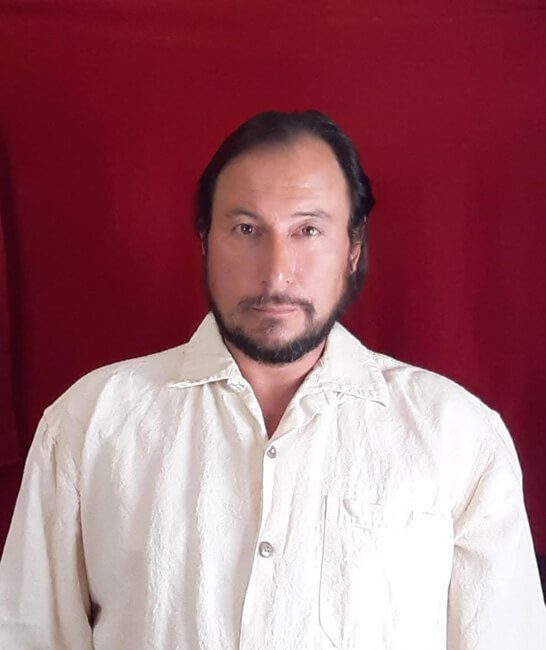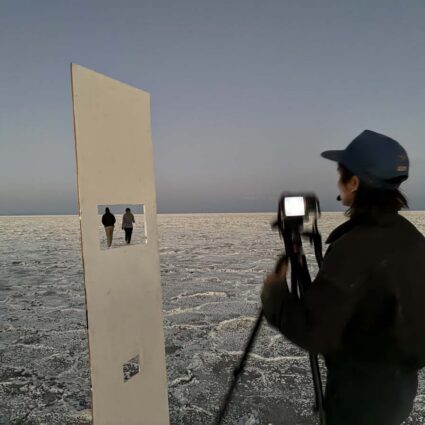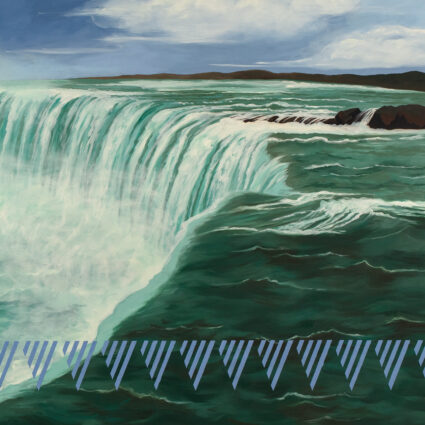Joshua Concha, multimedia artist and poet from Taos Pueblo, plans to promote ideals of peace, unity, love, and community as Taos, New Mexico’s third poet laureate.

SANTA FE, NM—Taos, New Mexico carries on its reputation as a literary hub with the announcement of its third poet laureate. The selection of Joshua Concha also represents an exciting movement moving forward and an acknowledgment of the town’s diverse cultural contributions.
Concha, a multimedia artist and poet from Taos Pueblo, was selected blind by a panel of four judges to take on the tenure from January 1, 2022 through December 31, 2023. In his application, he proposed a collaborative film project that combines visual art and poetry. Throughout his tenure, he will work on selecting work from a diverse pool of poets and visual artists that will uplift messages of peace, unity, love, and community.
“This has been a step-by-step progression of things with no expectations of becoming poet laureate of Taos,” Concha tells Southwest Contemporary. He calls his appointment “happenstance,” flowing from participation in a series of poetry workshops and events sponsored by SOMOS (Society of the Muse of the Southwest), a literary center in Taos, beginning in 2018. He also credits Catherine Strisik and Sawnie Morris, both former Taos poets laureate, for their influence and encouragement in his application process.
“It’s really an honor to all my teachers, from all the many various things I’ve gotten myself involved with over the years,” which includes vending at the Palace of the Governors in Santa Fe, says Concha. “There are just so many great teachers I’ve had that have contributed to my worldview and my artistic and creative sensibilities. And nowadays I apply those teachings to my poems and writings.”
Strisik, the 2020-2021 Taos poet laureate, first came across Concha’s poetry when he submitted to her Taos Poetry in Nature Project. She says she “read this gorgeous poem and thought, ‘Wow, who is this?’” Through the poem, she discovered a poet with a “beautiful quietness” and “such an acute observation of the natural world.”
“This feels bigger than what we even realize is big for Native American culture,” Strisik says of Concha’s appointment. “People are very, very excited about him stepping into this position.”
Through his poetry project, Concha is interested in focusing on a “countercultural reprise” of the activist and counterculture movements that took place in Taos during the 1960s and 1970s. He sees these resistances as the seeds of social change that are allowing Indigenous people—such as Joy Harjo, who’s currently serving her second term as poet laureate of the United States, and Deb Haaland, U.S. secretary of the interior—to make forward progress in the country today.
However, in contrast to previous decades, he says, “Taos has really opened up to many different walks of life and cultures, and we need to incorporate that and get that openness. For me, it’s not so much of a counterculture thing. I would like to call it an ‘encounter’ culture thing. We’re all kind of respecting one another’s cultural backgrounds and ethnicities and creating that sort of dialogue.”
Concha plans to incorporate his multimedia arts background into his poetry project by unifying poetry, film, and visual art. Although his ideas are still in development, “I do want to focus on the phenomenon that happens when people read a poem and their hearts and minds are changed through reading and experiencing the poem,” says Concha. “So whatever the source of the material is, I think, focusing on the themes of peace and unity, love, and community will be paramount.”
Throughout his tenure, Concha hopes to honor his ancestors from his community of Taos Pueblo as well as from his Anglo father’s side. “[Because] I come from both worlds,” he says. “I’m sort of a direct result of that intermingling of cultures in the ’70s that was going on here in Taos. [The poet laureate position] honors everyone who has been a part of my life, up to this point, and beyond now.”



